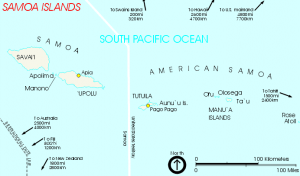Here it is, approximately four months after American Samoa reported their first outbreak of the mosquito borne virus, chikungunya, and Samoan health officials say that the virus is now affecting “the whole of Samoa”.
 A Radio New Zealand report states that there are now 2,500 confirmed cases of chikungunya and are calling improved awareness especially with the arrival of rainy season.
A Radio New Zealand report states that there are now 2,500 confirmed cases of chikungunya and are calling improved awareness especially with the arrival of rainy season.
The media source’s correspondent said:
“The Ministry of Health has released the latest figures and also with more advisories for the public to continue on the safety measures from the chickungunya because the number of people affected from October to November has increased to 259, and the total so far as of July, according to Ministry of Health figures is over 2,500 people with chikungunya.”
The chikungunya situation in Samoa prompted the Centers for Disease Control and Prevention (CDC) to issue an advisory for travelers to the Pacific islands.
Chikungunya is an illness caused by a virus that spreads through mosquito bites. The most common symptoms of chikungunya are fever and joint pain. Other symptoms may include headache, muscle pain, joint swelling, or rash. Chikungunya disease rarely results in death, but the symptoms can be severe and disabling. Most people who get sick feel better within a week. In some people, the joint pain may last for months or years.
There is currently no vaccine or medicine to prevent chikungunya. The only way to prevent chikungunya is toprevent mosquito bites. Preventing bites can be difficult, but it is important as you can get sick after just one bite. For more infectious disease news and information, visit and “like” the Infectious Disease News Facebook page


2 thoughts on “Chikungunya: With 2,500 confirmed cases, the ‘whole of Samoa’ affected”